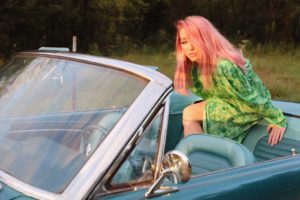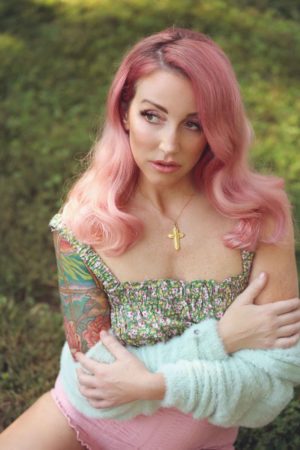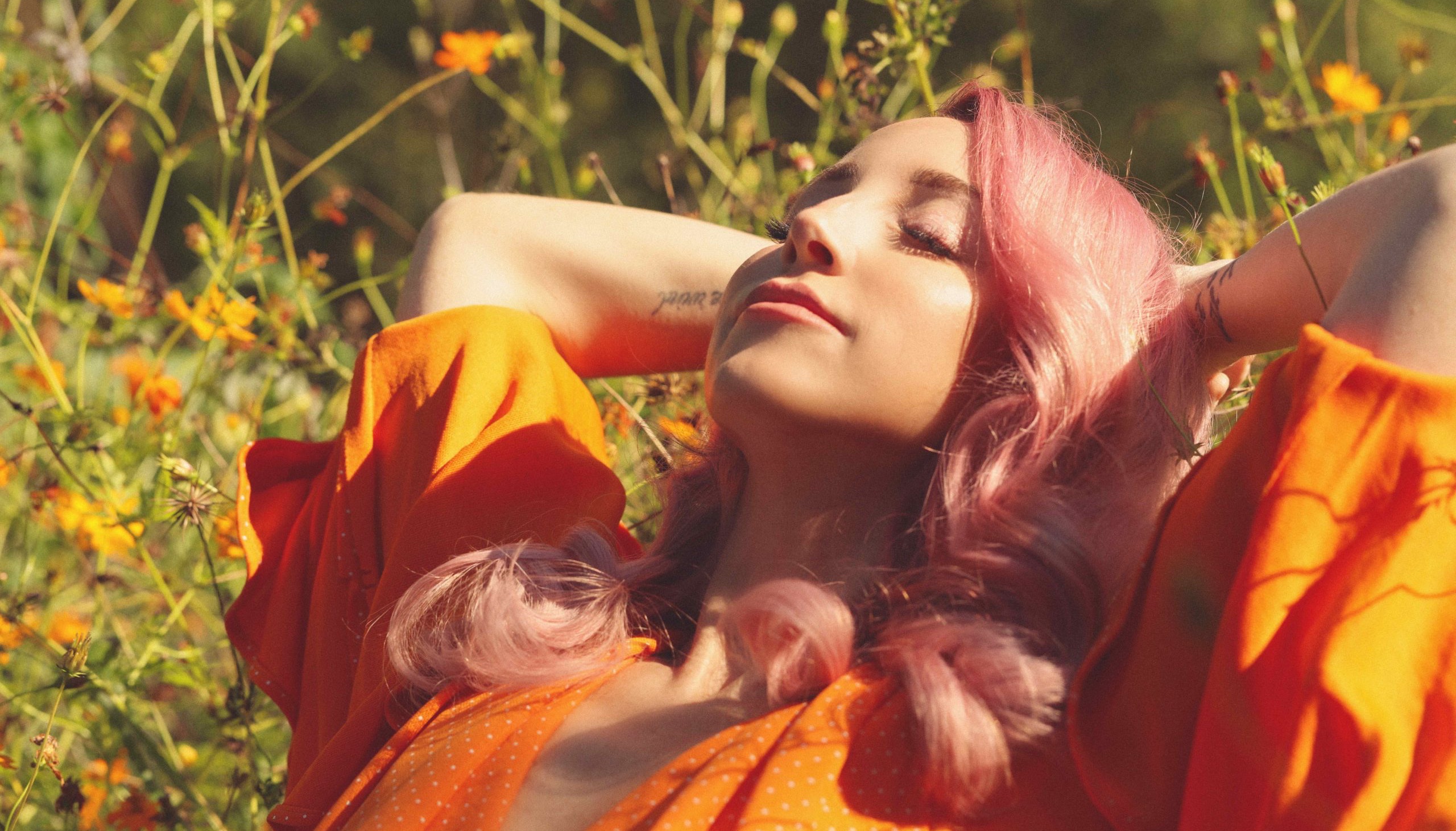Singer-songwriter Ashley Monroe is calling me from her “cloffice”—her closet fit with a desk, where she wrote several songs from her latest album Rosegold. She explains that she comes here sometimes while her household is sleeping, sometimes staring at her clothes and envisioning outfits. She’s nestled with her synthesizer when she tells me that the ambrosial melodies weren’t the only thing that came to her during those early morning writing hours.
“One day at the beginning of the pandemic I came in here and opened the curtains. I opened the window and there was a huge swarm of honeybees,” she says warmly with her Tennessee accent. “I’d never seen anything like it before. I sat there and wrote a poem about the queen. I took it as a sign, because honeybees are pretty powerful.” After recounting her research after spotting the hive, she recalls with awe, “I’m watching a miracle.”
Like the honeybees’ spirit, Monroe seems her most unrestrained on her fifth album. Rosegold is in some ways rose-tinted; literally, Monroe dyed her hair a shade of pale pink and mentions a favorite pair of gifted rose sunglasses. But, whereas the connotation of rose-colored glasses might leave onlookers skeptical, Rosegold is a lens, two years in the making, for her personal joy. “You can note that something’s not fine and still choose to be happy that day, or choose to spread light and know that that’s the only thing, maybe, you can help the situation with,” she tells me when I bring up the strange contrast.
Rosegold’s ten tracks are decadent and lush without being gaudy. Whether it’s her comparing one’s presence to “the glitter on a wave” or the amount of space between verse and chorus that feels like you’re pushed into zero gravity on highlight “See,” the album’s greatest achievement is its finely embroidered details. But Monroe’s growth doesn’t come without hardship. Take the stunner “‘Till It Breaks,” on which Monroe tenderly sings, “Sometimes it doesn’t come together ’til it breaks.” It’s a luminescent happy-and-sad song that doesn’t advise ignoring pain, but to accept it, eventually letting it melt away.
As a result it’s hard not to cling to these songs, to revel in joyous songwriting that’s not artificial—that makes you want to reflect on the rosegold in your own life. During our chat, she discussed protecting her joy, wanting to write for Tarantino, and how leaving Warner Brothers set her free.
You mentioned growing and changing since your twenties. I know this is jumping to the end of the album, but I’m curious if that coincides with “The New Me”?
I do feel, in a way, born again. I feel like a different person than I did. But I’m still that girl who’s grown. I’m still all the things that happened to me. All of those things makes me able to be a new me in sense. I never want to discredit my twenties. I had a lot of fun. I took way too many pills and I drank way too much. I did a lot of stuff that was very dumb, but I don’t shame myself anymore. I’m wise enough to see now that we all do what we have to do in order to get by. I’m glad I did the things I did, had the fun I had, and learned the lessons I learned from ’em.
But something about the love of when my son was born and me just trying to be a better person in general and trying to understand that love is the point. “Replace fear with love” is my big thing I’m trying to do now. The Bible teaches it. There’s a billion books that teach it. Almost every religion teaches it. I felt led to put a Bible verse, Isaiah 43:19, in “The New Me.” That just felt like such a hopeful, fresh start. I’m not trying to, like, control-alt-delete my old self.
I was hearing these melodies and it sounded heavenly. It sounded almost as if I wanted someone that doesn’t know if they believe in something—which is fine, but I wanted them to hear this, still get a wave of chills, and be like, “What does that mean?” Music can do that to us, the words alone can’t. Music is a spirit, really. It can move people if you create it to.
“But what is country? Every genre is just a word. I like John Williams, and then I’ll put on Roger Miller. Then I’ll put on Dominic Fike and then I’ll put on Frank Ocean… To me, music that moves people is music that moves people.”
Most of the tracks were recorded the day you wrote them. Is the album making process normally that quick for you?
This wasn’t that quick, because I’ve been working on it off and on, not consistently, for two years. At first, I thought it was just going to be five songs. I kept writing and I kept creating more that I felt were cohesive to those five and I thought, “Why stop?” I had time on this one, even though my vocals were done and the base of the song was produced the day I wrote it. But I still dug in and took my time and made more.
My co-writers are also amazing writers—every single one on this record, I loved writing with these people. Why don’t I just give them credit? Why go and try to copy something they’ve done? Which is what we do a lot of the time in the Nashville world: You do a demo session, you give it to a big star, and then you get an amazing band in and they try to recreate the demo. And half the time it’s never as good; it’s never got that magic. So if the base of it’s this good, I don’t really want to mess with anything else, with the magic from the day we wrote it being there. And I want these guys to be recognized for their great production skills. I would hate for someone else to come along like, “Well let’s try to copy this.” It doesn’t make sense to me.

You mentioned you didn’t want that song or the album to sound as country, did you know you wanted to stray from that?
I did. And there was no other reason except for what was inspiring me. Those were the songs that were coming out of me and I knew they weren’t country. But what is country? Every genre is just a word. I like John Williams, and then I’ll put on Roger Miller. Then I’ll put on Dominic Fike and then I’ll put on Frank Ocean, and then I’ll put on Kanye West, and then I’ll put on the Eagles. To me, music that moves people is music that moves people.
That was another part of this process: I want to be able to write different songs. I don’t know how to do hip-hop, but I’m moved by it and I know I listen to it. I have since I was a little girl. As an artist and a songwriter, I always want to move people. That’s what I want to be the common thread—I don’t want it to be that she only does one genre; she only writes one type of song. I said recently, “Nobody is just one thing, and if they are then they’re probably a tad bored.” I like showing there’s different colors, different sides, there’s different melodies. I just wanted it to be what it was without any restraints, not forcing it to be something different.
There’s hip-hop elements and trap beats, but also “Drive” has that Western flair. It’s all balanced.
That one I wanted to be like a Quentin Tarantino movie. I have a dream which could happen. Quentin Tarantino was born in Knoxville, Tennessee. I was born and raised there until 15. But I really want to score a movie for him. I don’t know how many he’s got left—but if I could just catch him here… Maybe the movie could be called Knoxville Girl or Something About Knoxville. He can write the movie, but I’m available to score it.
Many of these songs are happy or euphoric, and I read a quote where you were aware you weren’t writing sad songs anymore. What was that realization like?
It was a thing that happened in my life where I started being protective of my joy in general. Not that I don’t have to say sad things, not that I don’t feel sad, not that I’m not with friends when they’re feeling sad or going through hard times. I don’t even watch Dateline anymore, and that used to be like the highlight of my week. I used to watch murder mysteries and I don’t watch them anymore. Since I became a mom, I can’t stop thinking about the mom in whatever story.
I don’t do things that enhance anything that would make me sad, but it doesn’t mean that I’m in denial or don’t have sadness. I’m aware of what it feels like, I just don’t want to accentuate that feeling. And maybe this time in my life, when I’m not feeling sorrow, for a just a second anyways, I wanted to amplify that and shine a light on that and I wanted to make other people feel that. Like I said, I always want to move people. I want that to be a constant thing with me as an artist—when you put on something, it moves you in some way, whether it’s sad or happy. If you’ve got the power to make people feel joy—which, gosh, don’t we need it right now—if you’ve got the power to do that, then do that. That’s how I was feeling.
“I don’t do things that enhance anything that would make me sad, but it doesn’t mean that I’m in denial or don’t have sadness. Maybe this time in my life, when I’m not feeling sorrow, for a just a second anyways, I wanted to amplify that and shine a light on that and I wanted to make other people feel that.”
I mean, it doesn’t sound from the tone of how we’ve been talking about this album, but I’m curious, is there anything that surprised you when you were making this album?
Probably when I got let go from Warner Brothers, it’s like I didn’t realize how free I could be or something. There was nobody I had to answer to, and there was no deadline on the record. I’ve been on a label most of my life, since I was 17, and great labels, and labels that supported me and spent a lot of money trying to make me work. I’m in no way discrediting any of my labels, because honestly I loved all of them and I loved all the people that worked there. I just didn’t make anybody any money, and I get it. At some point you got to say goodbye. But something about that goodbye set me free all the way and I’ve never felt more inspired.
When did you find out that you were let go from Warner?
It must have been 2018. Maybe it was 2019. But I feel like it was, like, not too long after Sparrow was released. And I got my feelings hurt for like 10 minutes because you can’t not feel a little bit broken up with when somebody breaks it off with you. I was like [mock cries] then I was like “Come on, you dummy. That doesn’t mean you have to quit making music. Now let’s go. You’re free!” Then when I started hearing those melodies I was like “Ah, yeah!” FL








